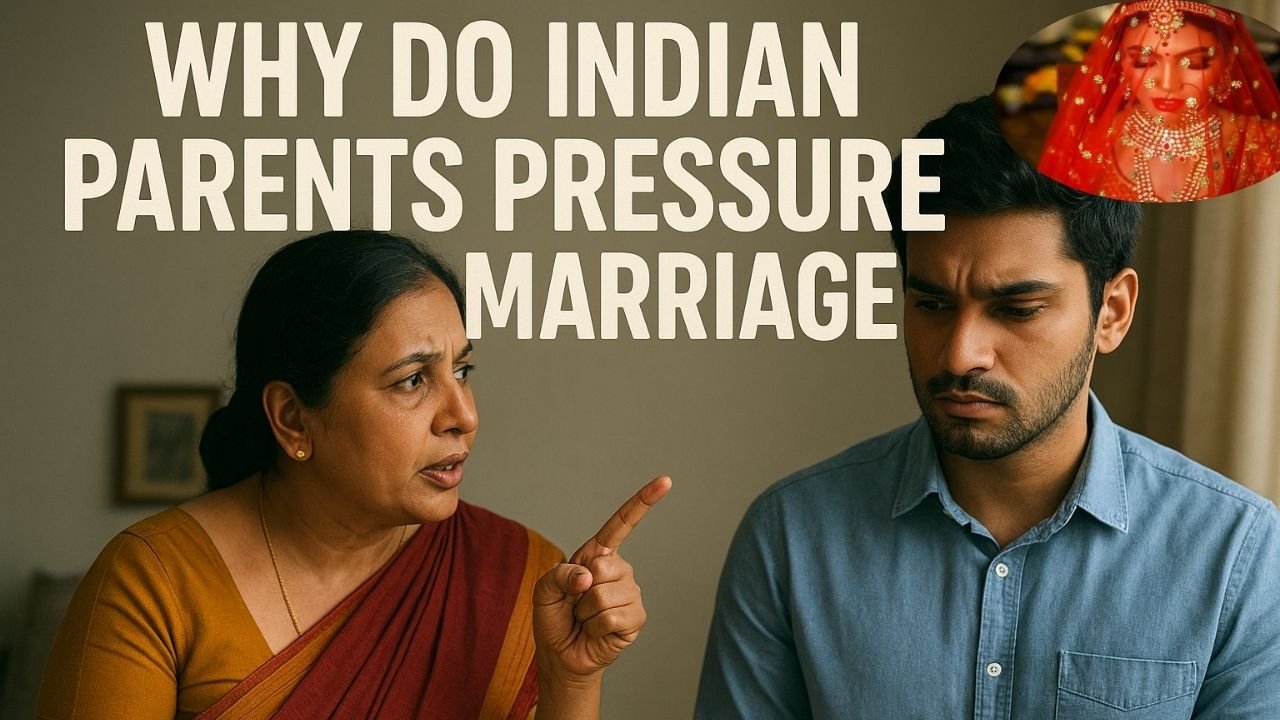Marriage in India isn’t just a personal choice—it’s a family mission that often feels more urgent than a medical emergency. If you’ve ever wondered why Indian parents pressure marriage with such relentless determination, you’re not alone. From the moment their children hit their twenties, many Indian parents transform into marriage detectives, armed with biodata, horoscopes, and an unshakeable belief that their child’s happiness depends entirely on finding “the right match” before some mysterious deadline expires.
This pressure isn’t just cultural folklore—it’s a deeply rooted phenomenon that affects millions of young Indians every day. According to recent data, 93% of married Indians had arranged marriages, revealing just how central parental involvement remains in Indian matrimonial decisions. But what drives this obsession? The answer lies in a complex web of cultural expectations, social fears, and generational beliefs that have shaped Indian society for centuries.
The Cultural DNA: Why Marriage Defines Family Honor
Marriage as Family Achievement, Not Personal Choice
In Indian society, marriage represents far more than two people falling in love. It’s treated as a family achievement that reflects social standing and cultural values. Parents view arranging their children’s marriage as one of their fundamental responsibilities, often saving money for decades to fulfill this “duty.”
This responsibility becomes so ingrained that many parents feel personally judged if their children remain unmarried past certain age milestones. Indian parents pressure marriage because they genuinely believe it’s their obligation to ensure their child’s future security and happiness.
The Social Status Game
Marriage in Indian families often functions as a status symbol. Parents who successfully marry off all their children gain social recognition and can proudly share their “accomplishment” within their community. Conversely, having unmarried adult children can lead to social stigma and unwanted questions at family gatherings and religious events.
This creates a domino effect where family reputation becomes tied to marriage timelines, making parents increasingly anxious as their children age without settling down.
The Age Anxiety: Understanding the Biological Clock Pressure
Statistical Reality of Marriage Ages in India
Current data shows that the average marriage age for women in India is 22.7 years, but this varies significantly across different states. While urban areas like Delhi and Punjab see marriages around 24-26 years, rural regions often witness earlier marriages.
The median age of first marriage has increased by 2.0 years over the past decade, rising from 17.2 years in 2005-06 to 19.2 years in 2019-21 for women. Despite this gradual increase, parental pressure often intensifies as children approach their late twenties.
The “Biological Clock” Narrative
One of the strongest drivers behind why Indian parents pressure marriage involves concerns about fertility and childbearing. Parents frequently invoke the “biological clock” argument, especially for daughters, fearing that delayed marriage might complicate future pregnancy plans.
This fear isn’t entirely unfounded in traditional thinking, but it often creates unnecessary stress and panic about natural life progression, leading to rushed decisions that prioritize timing over compatibility.
Economic Security and Financial Calculations
Marriage as Financial Insurance
Many Indian parents view marriage as financial security for their children’s future. They believe that a well-settled spouse can provide economic stability that might be difficult to achieve independently, especially in uncertain economic times.
This perspective is particularly strong for daughters, where parents often seek financially stable grooms who can “provide and protect.” The underlying assumption is that marriage offers a safety net that single life cannot guarantee.
The Dowry and Status Economics
Despite legal prohibition, dowry considerations still influence marriage pressure in many families. Parents worry about increasing dowry demands as their children age, creating financial pressure to arrange marriages quickly.
Additionally, parents often seek matches that enhance their family’s economic and social position, viewing marriage as a strategic alliance between families rather than just a personal relationship.
Deep-Rooted Gender Expectations and Traditions
Different Rules for Sons and Daughters
Indian parents pressure marriage differently based on gender. Daughters often face earlier and more intense pressure, with families concerned about safety, reputation, and social acceptance. The traditional belief that women need male protection drives much of this urgency.
Sons typically experience pressure related to carrying forward the family name, taking care of aging parents, and fulfilling the role of family provider. The expectation that marriage will make them more “responsible” adds another layer of parental anxiety.
The Caste and Community Factor
Caste considerations remain a significant factor in marriage pressure. Parents often worry that suitable matches within their community become scarce with time, leading to increased urgency to find appropriate partners who meet traditional criteria.
This creates a complex situation where personal preferences must align with family expectations about caste, community, religion, and social status—adding multiple layers of pressure to an already complicated decision.
Fear-Based Motivations: What Really Drives the Pressure
Fear of Social Isolation
Indian parents genuinely fear their children will face loneliness and social isolation without marriage. In a society where most social activities revolve around families and couples, unmarried individuals can feel excluded from community celebrations and gatherings.
Parents project their own experiences and observations, believing that marriage provides essential emotional support and social belonging that single life cannot offer.
Fear of Changing Times
Many parents worry that modern dating culture and changing social values might lead their children to make “wrong” choices. They believe their experience and wisdom can guide better partner selection than their children’s independent choices.
This fear intensifies when parents see divorce rates increasing or hear stories of failed relationships, making them more determined to control the marriage process to ensure better outcomes.
The Mental Health Impact: When Pressure Becomes Harmful
Psychological Consequences of Marriage Pressure
Constant marriage pressure can lead to significant mental health challenges, including anxiety, depression, and loss of self-esteem. Young adults often report feeling that their worth is measured solely by their marital status rather than personal achievements.
This pressure can create lasting psychological impacts, including fear of disappointing parents, anxiety about making life decisions, and confusion about personal desires versus family expectations.
Career and Personal Growth Disruption
Marriage pressure often interrupts career ambitions and personal development goals. Young professionals, especially women, may feel forced to choose between career advancement and family expectations, leading to resentment and unfulfilled potential.
The rush to marry can also result in inadequate time for self-discovery, making it difficult for individuals to understand their own preferences and compatibility needs.
Changing Perspectives: The Modern Shift
Growing Awareness Among Parents
Recent trends show that more Indian parents are becoming open to delayed marriages and love marriages. Exposure to global cultures, education, and changing economic realities are gradually shifting traditional perspectives.
Younger generations of parents, having experienced more diverse life paths themselves, are beginning to prioritize their children’s happiness over rigid timelines and traditional expectations.
The Role of Education and Economic Independence
Higher education and financial independence are slowly changing the marriage pressure landscape. Educated young Indians are increasingly asserting their right to choose when and whom to marry, leading to more balanced family discussions about marriage timing.
Economic independence gives young adults more leverage to resist unwanted pressure while maintaining respectful family relationships.
Conclusion
Why Indian parents pressure marriage stems from a complex combination of cultural responsibility, social expectations, economic concerns, and genuine love for their children’s welfare. While these motivations often come from a place of care and protection, the pressure can sometimes become overwhelming and counterproductive.
Understanding these underlying reasons can help both parents and children navigate marriage discussions more empathetically. The key lies in finding balance between respecting cultural values and honoring individual choices, creating space for open dialogue that considers both generational perspectives and personal happiness in the journey toward Indian parents pressure marriage decisions.
Modern Indian families are slowly learning to blend tradition with personal agency, recognizing that true family honor comes from raising confident, happy individuals who make thoughtful life choices—whether that includes early marriage, later marriage, or alternative life paths altogether.

